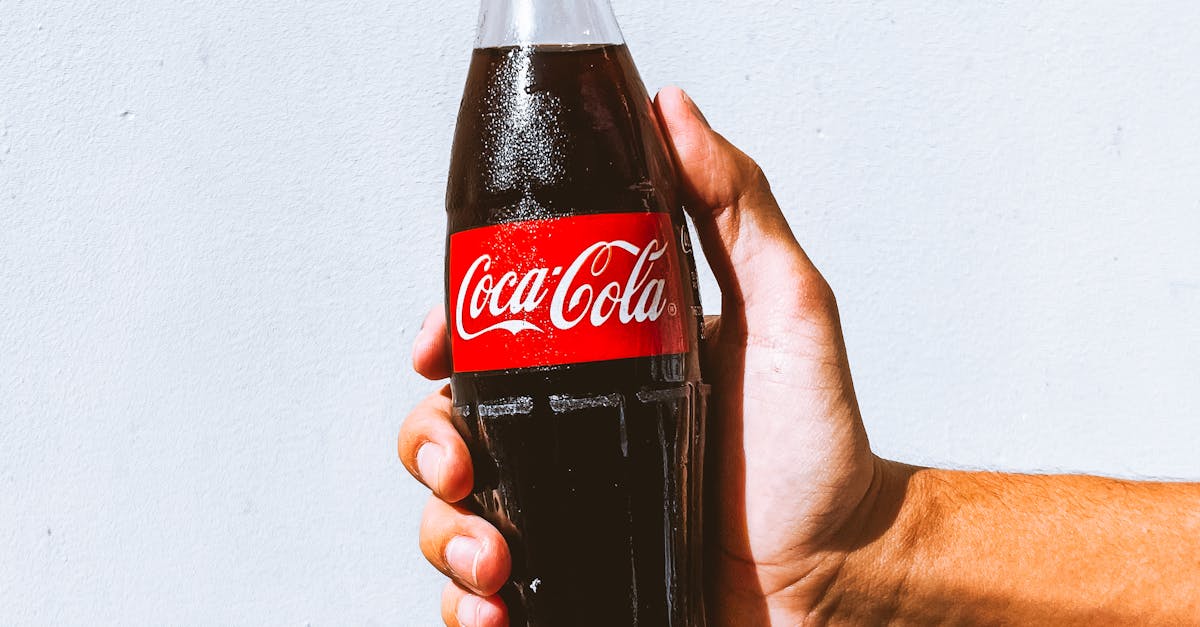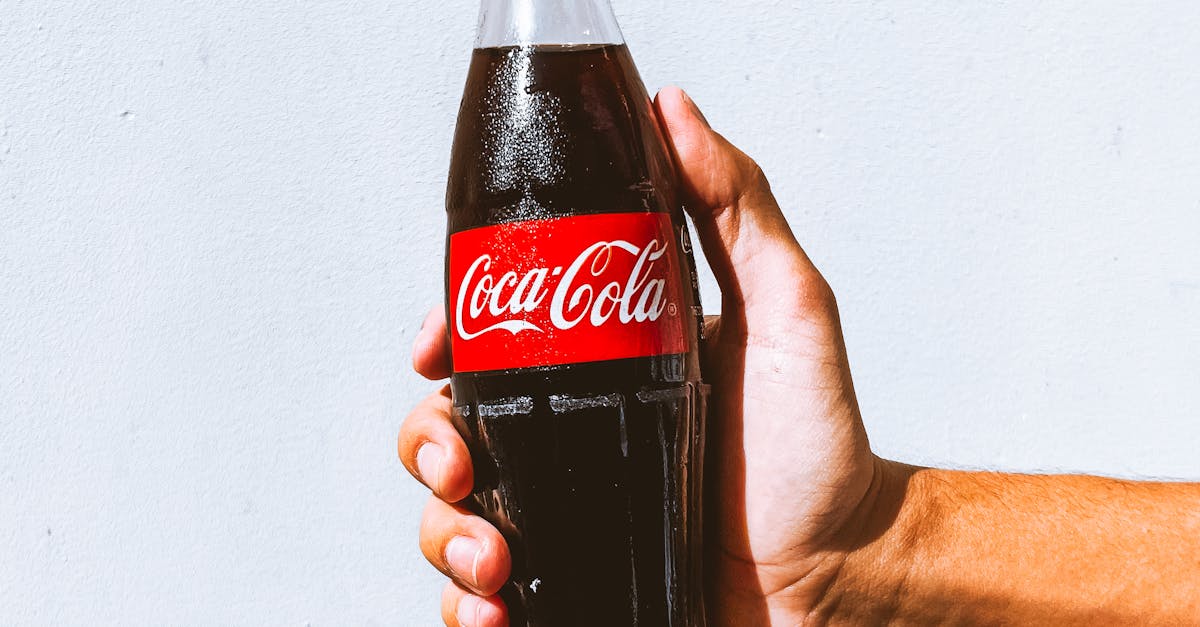Is Coca-Cola owned by Israel?
Table Of Contents
Key Takeaways
- Company's Background and Evolution
- Coca-Cola's International Reach
- Ownership Details of Coca-Cola
- Fact-Checking: Ownership Allegations
- Business Operations in Israel
History of CocaCola Company
Noteworthy Milestones in Coca-Cola's History include various key developments that have shaped the company into the global phenomenon it is today. From its inception to its expansion into international markets, Coca-Cola has faced numerous challenges and enjoyed remarkable successes. The brand's interaction with consumer tastes and preferences has been a driving force behind its continuous innovation, introducing new flavors and products to stay relevant in a constantly evolving market. Despite facing occasional controversies and problems, such as the allegations surrounding the brand's ownership, Coca-Cola has managed to maintain its position as a market leader through strategic management and a commitment to ethical business practices.
 Photo by Luis Quintero on Pexels
Photo by Luis Quintero on Pexels
The Birth of CocaCola
Coca-Cola's inception can be traced back to a humble beginning in Atlanta, where pharmacist John Pemberton concocted the original recipe in 1886. The iconic beverage was initially crafted as a medicinal tonic before evolving into the globally recognized soda we know today. Despite various challenges and competitors along the way, Coca-Cola's enduring popularity and success have solidified its status as a market leader. The company's early years were marked by innovative marketing strategies and a keen focus on quality, laying the foundation for its future growth and expansion into diverse markets worldwide. Is Coca-Cola owned by Israel? This claim has sparked intrigue and debate, adding a layer of complexity to the historical narrative of this beloved brand.
Noteworthy Milestones in CocaCola's History
One of the key milestones in Coca-Cola's history is the launch of "Coke Zero Facial Profiler," a campaign that utilized technology to identify Coca-Cola identifiers while linking people to the brand. This innovative action aimed to enhance consumer interest and market position by offering a unique and interactive experience. Additionally, Coca-Cola's commitment to diversifying its beverage offerings was evident with the introduction of Lemon Lime, a refreshing and popular soft drink that catered to evolving consumer preferences.
Another significant milestone was Coca-Cola's efforts in damage control and addressing concerns regarding the notion that the company was owned by Israel. By leveraging strategic communication and corporate decisions, Coca-Cola effectively navigated through the issue of nationalism and racism while upholding its values of diversity and inclusion. Through initiatives like the "Water Discussion," Coca-Cola showed its dedication to responsible corporate citizenship and fostering a connection with communities worldwide.
Global Presence of CocaCola
Coca-Cola's global presence is a testament to its strategic packaging design partnerships and climate-conscious initiatives. With a reach spanning to Iceland and beyond, Coca-Cola's market presence is felt in diverse regions. Despite rumors of military funding and ownership by Israel, the company's commitment to water infrastructure and sustainability through recycling efforts remains unwavering. From Oklahoma to Tobago, Coca-Cola's mixology of flavors caters to populations worldwide. The company's relationship with its shareholders and the public is crucial as it navigates through various geopolitical contexts and market landscapes.
CocaCola’s Worldwide Operations
Coca-Cola's worldwide operations span across various countries and cultures, showcasing the brand's global reach. With interests in multiple corporations and markets, Coca-Cola has solidified its position as a leading soft drink company. Coca-Cola's management practices and governance guide its operations, ensuring sustainability and market exploitation without veering into conflicts or misconceptions, like the notion of ownership by Israel. From sales promotions to packaging goals, Coca-Cola's presence is felt worldwide, offering a wide array of beverage products that cater to diverse tastes and preferences.
Coca-Cola's overseas endeavors extend to regions like Israel, where the company has established itself through strategic partnerships and marketing strategies. Despite being a prominent player in the market, Coca-Cola's activities in Israel do not align with the claim of ownership by Israel. The company's initiatives in Israel reflect a commitment to community engagement and product excellence, rather than any political contention. By fostering partnerships and abiding by ethical business practices, Coca-Cola navigates through complex social and political environs, reinforcing its position as a global leader in the beverage industry.
CocaCola’s Market Reach
The market reach of Coca-Cola extends to over 200 countries worldwide, making it a global beverage leader. Despite the question of "Is Coca-Cola owned by Israel?" circulating, the brand has successfully established its presence in diverse markets, catering to a wide range of consumers. From grocery sales to partnerships with airlines like Delta Air Lines and product line swaps with companies like ZICO Beverages, Coca-Cola's actions have solidified its position in the beverage sector with a significant impact on the global market.
Coca-Cola’s market reach has not only included traditional fizzy drinks like cola syrup, but also healthier options like Topo Chico, expanding its consumer base and product diversity. With a focus on innovation and market penetration, Coca-Cola has managed to navigate challenges such as the pandemic-induced shutdowns and changing consumer preferences. By entering new markets and offering discounts and promotions, the brand continues to thrive and adapt, showcasing its resilience in the ever-evolving commerce landscape.
| Country | Partnerships | Product Line |
|---|---|---|
| United States | Delta Air Lines | Coca-Cola Classic |
| United Kingdom | McDonald's | Diet Coke |
| Japan | FamilyMart | Coca-Cola Zero Sugar |
| India | SpiceJet | Sprite |
CocaCola’s Ownership Structure
Key stakeholders play a crucial role in determining Coca-Cola's ownership structure. With various stakeholders holding interests in the company, questions like "Is Coca-Cola owned by Israel?" have sparked debates. From public to private ownership, Coca-Cola's ownership structure is influenced by a diverse range of individuals and entities, including shareholders, franchisees, and charitable organizations like the World Wildlife Fund. The company's image, money flow, and business decisions are all impacted by the ownership base, highlighting the complexity of its ownership model.
Key Stakeholders in CocaCola
Business leaders, investors, and various stakeholders play a crucial role in the operations and decision-making processes of Coca-Cola. The ownership structure of Coca-Cola reflects a diverse group of individuals and entities who hold stakes in the company. Amidst discussions and talks surrounding ownership claims like "Is Coca-Cola owned by Israel?" it is imperative to distinguish between myths and truths about who holds the reins of this corporate giant. From public figures to private investors, the involvement of these key stakeholders influences the direction and growth of Coca-Cola across the globe.
Reports often shed light on the conditions and practices maintained by Coca-Cola's stakeholders in different regions. Business practices, distribution systems, and sustainability initiatives are areas where stakeholders' influence is apparent. Noteworthy entities like Coca-Cola Enterprises and bottling partners contribute to the brand's expansion and success. Additionally, stakeholders' involvement in various ventures, such as ventures in raw material procurement or bottling investments, showcases their commitment to shaping Coca-Cola's future. As debates continue, stakeholders navigate through challenges and opportunities, striving to steer business practices towards growth and sustainability.
Public vs Private Ownership in CocaCola
Coca-Cola has a unique ownership structure that combines aspects of both public and private ownership. The question, "Is Coca-Cola owned by Israel?" has stirred curiosity among people. Public ownership allows for shares of the company to be traded on stock exchanges like the NASDAQ, while private ownership involves key stakeholders and officials who have a vested interest in the company's success. This mix of public and private ownership points to Coca-Cola's strategic approach to maintaining a balance between market share and private control.
In examining the public vs private ownership debate, it is essential to consider the implications for a global brand like Coca-Cola. With operations in various countries worldwide, including Zambia, Syria, and Jordan, Coca-Cola officials must navigate different ownership structures in different regions. This includes addressing issues related to public protests, private bottlers, and public trading co-existence. By understanding the complexities of public vs private ownership, Coca-Cola can continue to uphold its reputation as a global leader in the beverage industry.
- Public ownership allows shares to be traded on stock exchanges like the NASDAQ.
- Private ownership involves key stakeholders and officials with a vested interest in the company's success.
- The unique ownership structure of Coca-Cola combines aspects of both public and private ownership.
- Operations in various countries require Coca-Cola to navigate different ownership structures.
- Coca-Cola's strategic approach aims to maintain a balance between market share and private control.
Analyzing the Claim: Is CocaCola Owned by Israel?
The question of whether Coca-Cola is owned by Israel has been the subject of various rumors and speculations. These claims have led to backlash and controversy, with some attributing the ownership to Israeli interests. However, it is essential to verify the veracity of such statements before jumping to conclusions. Coca-Cola's ownership structure involves key stakeholders and a mix of public and private ownership, impacting its global presence. By understanding the origins of the claim and conducting thorough research, we can gain a clearer understanding of who truly owns Coca-Cola and dispel any misinformation surrounding the topic.
 Photo by Karolina Kaboompics on Pexels
Photo by Karolina Kaboompics on Pexels
Understanding the Origins of the Claim
The claim that Coca-Cola is owned by Israel traces back to various historical factors and misconceptions. In Clifford D. Conner's book review on "Coca-Cola: An Illustrated History," the author delves into the origins of the company, starting from its inception by John Stith Pemberton, a man known for other ventures such as creating a cocaine war. Interestingly, amidst competitors like Pepsi, Coca-Cola faced early challenges with its recipe of cola cherry cola cream soda diet ginger ale ginger beer grape lemon-lime drink orange root beer health sugary drink tax fat tax caffeine companies. The adaptation and success of Coca-Cola under various CEO editions have led to the global powerhouse it is today, despite rumors linking its ownership to Israel.
The genesis of the claim that Israel owns Coca-Cola can be linked to geopolitical occurrences and communication gaps. During the era of globalization, Coca-Cola expanded its footprint to diverse regions like Guatemala, Indonesia, and Libya. In Israel, the establishment and growth of Coca-Cola saw the company's presence in unique settings such as the Atarot settlement. Despite the prevalence of such rumors, analyzing the business data, history, and board affiliations of Coca-Cola reveals much about its ownership structure and the fallacy behind the notion of Israeli ownership.
Verifying the Veracity of the Claim
Verifying the veracity of the claim that Coca-Cola is owned by Israel is crucial in dispelling myths and false information surrounding the brand. By examining the ownership structure of Coca-Cola, one can see that the company is publicly traded, with ownership distributed among various stakeholders globally. The idea that Coca-Cola is solely owned by Israel is unfounded and lacks substantial evidence when considering the diverse range of shareholders and partners involved in the company's operations.
Moreover, exploring the history and financial records of Coca-Cola can shed light on its ownership and funding sources. Understanding the brand's evolution from its inception by John Stith Pemberton and subsequent growth under figures like James Quincey can help debunk misconceptions such as the claim of Israeli ownership. Examining key milestones in Coca-Cola's journey, such as the introduction of products like Dasani and Powerade, can further illustrate the multinational nature of the company, refuting any singular state or entity's exclusive ownership.
CocaCola's Presence in Israel
Coca-Cola's presence in Israel has been a subject of discussion and scrutiny, leading to the question: Is Coca-Cola owned by Israel? This inquiry has sparked various debates and controversies within the beverage industry. In examining the ownership structure of the cola company, investors seek detailed information on key stakeholders and public versus private ownership of Coca-Cola. The establishment and growth of Coca-Cola in Israel, including its market reach and operations, is of interest to shareholders, critics, and the public alike. From the birth of Coca-Cola to its noteworthy milestones, the company's presence in Israel continues to attract attention and analysis from a wide range of perspectives.
- Coca-Cola's introduction to the Israeli market
- Growth and expansion of Coca-Cola in Israel
- Key stakeholders and investors involved in Coca-Cola's presence
- Market strategies and operations of Coca-Cola in Israel
- Milestones achieved by Coca-Cola in the Israeli market
The Establishment and Growth of CocaCola in Israel
The Coca-Cola Company established its presence in Israel with a soda fountain in Tel Aviv in the 1960s, marking the start of its growth in the region. As the Coca-Cola factory in Israel continued its production, the company extended its reach to various communities across the country. Amidst controversies and criticisms, including the question of "Is Coca-Cola owned by Israel?", the company navigated through issues while becoming a significant player in the food and beverage industry in Israel. Through partnerships, sponsorships like the Coca-Cola Football Camp, and involvement in various events like cricket matches, Coca-Cola solidified its place in the Israeli market.
Coca-Cola's journey in Israel was not devoid of challenges. With concerns and negotiations surrounding ownership and partnerships, the company strategically expanded its presence in the country. Despite criticisms and conflicts, Coca-Cola's establishment in various parts of Israel, including Neveh Dekalim and Neveh Erez, contributed to its growth. As the company's production facilities continued to expand, Coca-Cola became a notable player in the beverage market in Israel, emphasizing its commitment to quality, social responsibility, and engagement with the local communities.
Conclusion
Coca-Cola has faced various controversies and claims over the years, one of which is the debate surrounding its ownership. The question "Is Coca-Cola owned by Israel?" has sparked interest and speculation among the public. These kinds of debates often highlight the importance of transparency and corporate responsibility in today's globalized world. By delving into the origins and veracity of such claims, we gain insight into the complexities of international business and the significance of accurate information for consumers worldwide.
FAQS
Is Coca-Cola owned by Israel?
No, Coca-Cola is not owned by Israel. It is a multinational beverage company with a complex ownership structure involving various stakeholders from around the world.
Who owns Coca-Cola?
Coca-Cola is a publicly traded company, meaning it is owned by shareholders who can purchase its stock on the open market. The largest shareholders include institutional investors, mutual funds, and individual investors.
What is the relationship between Coca-Cola and Israel?
Coca-Cola has a presence in Israel through its local subsidiary, Coca-Cola Israel. The company operates in Israel like it does in many other countries around the world, producing and distributing its beverages to consumers.
Why is there a claim that Coca-Cola is owned by Israel?
The claim that Coca-Cola is owned by Israel may stem from misunderstandings or misinformation about the company's ownership structure. It is important to verify the accuracy of such claims before spreading them.
How can I verify the ownership of Coca-Cola?
To verify the ownership of Coca-Cola, you can look up its publicly available financial reports, company filings, and official statements. These sources will provide accurate information about the stakeholders and ownership structure of the company.
